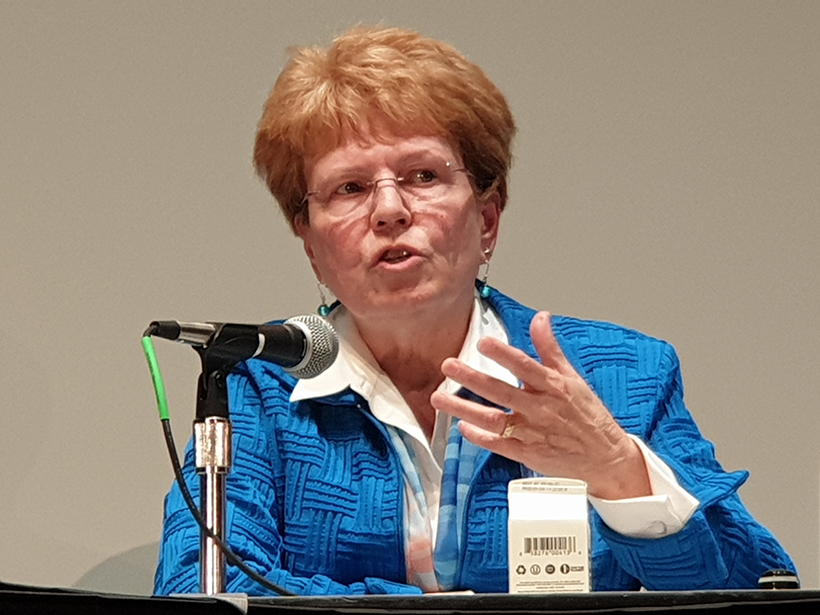Stating that “this is a moment of truth” about the climate crisis and related issues like biodiversity loss and ecosystem disruptions, renowned environmental scientist Jane Lubchenco has called for “a renewed social contract for science.”
Lubchenco, a former administrator of the National Oceanic and Atmospheric Administration (NOAA) and U.S. undersecretary of commerce for oceans and atmosphere, is challenging the scientific community to think about “our obligations as scientists [and] our responsibilities to society, to each other, to future generations.”
Lubchenco issued her renewed challenge at a 10 December session at AGU’s Fall Meeting 2019 in San Francisco, Calif. It came 22 years after she initially issued a call for a new social contract for science. That earlier call urged scientists “to devote their energies and talents to the most pressing problems of the day”—including urgent and unprecedented environmental and social changes—“in proportion to their importance, in exchange for public funding.”
“I believe that we have an obligation to be helpful to society.”
“I believe that we have an obligation to be helpful to society,” said Lubchenco, a professor at Oregon State University. “To me, it means that the responsibilities go beyond doing really cool science and publishing it to share it with other scientists. To me, that obligation means doing science and sharing it widely, but also working on issues that in times of serious need deserve particular attention.”
Lubchenco said that for science to inform understanding and action, it needs to be accessible, understandable, relevant, credible, salient, and useful. However, she said that all too often, science does not meet those benchmarks.
Making the situation even more complicated is “this post-truth world that has emerged, especially in the 2016 election, not just in the U.S. but around the world. And that makes some of these challenges even more problematic,” she said.
“One of the reasons that there is antagonism to science is the orchestrated campaign that has existed to sow misinformation [and] disinformation to distract people,” Lubchenco said. “There are active attempts by vested interests to create this nonsense that we don’t know enough about climate change, for example, to act.”
Lubchenco said that marches in defense of science have been among a series of positive measures by scientists. She added, “More and more environmental scientists are actively sharing their science broadly. They’re conducting use-inspired science. They’re engaging with society. They’re crafting solutions.”
However, Lubchenco said that although these efforts show real progress, they are insufficient to fulfill the science community’s responsibilities to society. “It’s not enough to overcome the serious impediments that exist in society, in science, and in academia,” she said.
A major impediment in society, she said, is that “the power that vested interests have to control the narrative and to buy elections is quite problematic.”
Impediments Within Academia
“I think it’s time for us collectively to make a quantum leap in our engagement with society. It’s time to change the culture of academia and to mobilize enabling conditions for science to serve society more effectively.”
Lubchenco also focused on impediments in the culture of academia. “It doesn’t reward engagement with society, it doesn’t reward communication, it doesn’t reward creating solutions.”
She said that academia needs to embrace an incentives system that rewards these efforts rather than just rewarding successes in metrics such as grant and publication numbers. She also called for academia to provide more training and mentoring to improve communication efforts and active engagement with the broader community and to enable partnerships whether with local communities, nongovernmental organizations, or other groups.
“I think it’s time for us collectively to make a quantum leap in our engagement with society,” Lubchenco said. “It’s time to change the culture of academia and to mobilize enabling conditions for science to serve society more effectively.”
—Randy Showstack (@RandyShowstack), Staff Writer
Citation:
Showstack, R. (2019), Former NOAA head calls for renewed social contract for science, Eos, 100, https://doi.org/10.1029/2019EO137883. Published on 13 December 2019.
Text © 2019. AGU. CC BY-NC-ND 3.0
Except where otherwise noted, images are subject to copyright. Any reuse without express permission from the copyright owner is prohibited.
Text © 2019. AGU. CC BY-NC-ND 3.0
Except where otherwise noted, images are subject to copyright. Any reuse without express permission from the copyright owner is prohibited.

